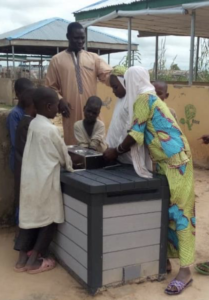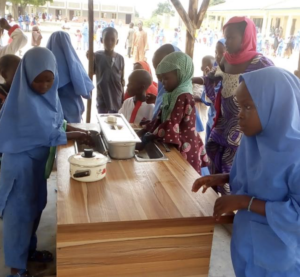October 26, 2021
Gravit`eau handwashing systems recycle water and reduce water consumption to about 5 ml of water per hand wash. The gravity-driven autarkic setup works without a power supply. We share the results of a 12-month evaluation of the Gravit`eau handwashing systems in a refugee camp in Nigeria.
Organisations: the project is a collaboration between Gravit`eau Association, Terre des hommes and University of Applied Sciences and Arts Northwestern Switzerland FHNW
By: Fabian Peter (Gravit`eau), Bruno Pascual (Terre des hommes), Sébastien Mercier (Terre des hommes), and Maryna Peter (Gravit`eau / FHNW)
How do Gravit`eau handwashing water-recycling systems work?
To wash hands, water is pumped by a foot pump to the water-saving outlet. Greywater generated flows into a sink which is connected to a sand and grease trap where floating ingredients and grease or large particles from hands and soap are separated from the water. Pre-treated water flows into the membrane tank where it passes by gravity through a gravity-driven membrane filter. The membrane filters pores are smaller than pathogenic organisms including bacteria and viruses. Those are retained by the membrane and accumulate in a biofilm and/or die in the membrane tank. Due to biological processes, the membrane does not clog. The purified water is collected in the clean water tank, from where it is pumped to the tap.
A chlorination step can be added if needed or required by regulations, for example in health care facilities or during epidemics. While larger particles, bacteria, viruses, and some macromolecules are retained by the filter, smaller organic molecules contained in the soap, such as tensides, pass through. They accumulate in the system eventually leading to a deterioration of aesthetic water quality. Thus, water in handwashing systems requires replacement every 2-4 weeks depending on the frequency of use and designed capacity of the system. A granular activated carbon filter can extend this period if required. The systems do not require a power supply. They can be produced locally using a small kit provided from Europe which contains a membrane module, key connections and the foot pump. The technology has been developed by the Gravit`eau association and evaluated in collaboration with Terre des hommes and the University of Applied Sciences and Arts Northwestern Switzerland FHNW.
Handwashing water recycling system, Photo by Gravit`eau
Context
North-east Nigeria remains the epicentre of a protracted humanitarian crisis, with more than 2.1 million IDPs, and many conflict incidents reported monthly. Access to basic services, including WASH services, is particularly problematic due to these high volumes of population movements as well as limited water resources. More than 2.8 million people are estimated to require WASH assistance, with more than 50% children. Terre des hommes has been providing WASH assistance to IDPs in Nigeria since 2017.
What did we learn by evaluating 17 pilot systems in Nigeria?
The main objectives of the study were:
The results of the 12-month field evaluation showed that the systems were well accepted and used by children in CFSs and schools. 350-600 children used each system per day, with peak uses of 1000-1600 children per day per system in schools recorded in March 2020. Water used for handwashing was reduced by approx. 97.4%. On average, systems saved around 9000 L of water per month for 500 children. The maintenance interval was kept to once a month for CFS systems, weekly- to twice a month in school systems. The membrane filter reduces the bacteria counts in recycled water by 99.9-99.999%.
What is planned next?
Currently, we establish local production in Nigeria, Burkina Faso and Mali and plan to evaluate 70 systems in total within November 2021- April 2022 in health care facilities and schools. We further adapt the design of the systems to address different user needs and further improve technical performance. The hands4health project started in 2021, aims to integrate Gravit`eau handwashing systems into a systematic approach to hand hygiene, water and sanitation in primary health care facilities and schools not connected to functional water and/or energy supply systems.
Gravit’eau water recycling handwashing systems combined with the RANAS behaviour change model can exponentially increase handwashing in humanitarian and water-scarce settings.
 .
.  Handwashing water recycling systems with multiple taps in the Mafa camp in Nigeria. Photos by Terre des hommes
Handwashing water recycling systems with multiple taps in the Mafa camp in Nigeria. Photos by Terre des hommes
Subscribe to our mailing list to receive regular updates from the Global Handwashing Partnership or follow us on social media.
© 2017 The Global Handwashing Partnership (GHP).